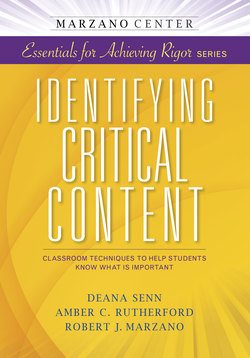Описание книги
Academic standards call for increased rigor, but simply raising complexity is not enough. Students must also take responsibility for their own learning. They need to be able to determine which content is critical, why it is important, how it connects to their existing knowledge, and when it will inform their future learning. <P> <I>Identifying Critical Content: Classroom Techniques to Help Students Know What is Important<I> explores explicit techniques for mastering a crucial strategy of instructional practice: teaching students the skill of identifying critical content. It includes:<BR>• Explicit steps for implementation<BR>• Recommendations for monitoring if students are able to identify critical content<BR>• Adaptations for students who struggle, have special needs, or excel in learning<BR>• Examples and nonexamples from classroom practice<BR>• Common mistakes and ways to avoid them<P>The Essentials for Achieving Rigor series of instructional guides helps educators become highly skilled at implementing, monitoring, and adapting instruction. Put it to practical use immediately, adopting day-to-day examples as models for application in your own classroom.
